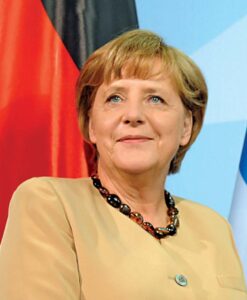 The Program on Negotiation at Harvard (PON) sends to subscribers a daily blogpost of interesting negotiation thoughts and analyses.
The Program on Negotiation at Harvard (PON) sends to subscribers a daily blogpost of interesting negotiation thoughts and analyses.
It regularly visits the negotiation styles of world leaders with the idea that ‘by studying the negotiation styles of famous leaders, we can identify what to emulate and what to abandon’.
Unsurprisingly it has shone a spotlight on Angela Merkel several times, reflecting on what we can learn from her negotiation style.
These articles prompted me to make a deeper study of her political life because it seemed to me that the October 2020 survey, which identified that 75% of adults in 14 European countries trusted Merkel more than any other leader in the region, signalled that there were more profound negotiation and dispute resolution lessons to be learned from her.
Here are the gifts I take from Merkel’s public life:
- Doing nothing – at least for now.
Merkel’s detractors have been very critical of the time she takes to make decisions. In fact ‘Merkeln’ has been added to the lexicon as a new German verb. Defined as ‘to do nothing, make no decisions, issue no statements’ it was nominated by the German dictionary publisher Langenscheidt[i] for Youth Word of the Year.
However in a world full of parties rushing to react to every event, isn’t the discipline we need to engage in deep reflection? – ensuring we have an independent model of behaviour where we act rather than react.
This seems to be congruent with William Ury’s wise advice about going to the balcony. He tells us that ‘our greatest challenge in negotiation is ourselves – and our tendency to react without thinking’. He counsels us to use the opportunity of going to the balcony as a way of keeping our eyes on the prize.
So I am choosing to add Merkeln to my repertoire and to see it as an acknowledgement of the power of acting rather than reacting.
- Say less to communicate more
We are accustomed to our politicians being loud and brash. To demonstrate extroverted and at times narcissistic behaviour. Merkel shows us the gifts of an introverted leader. It has been estimated that her 80:20 rule is to spend 80% of her time listening and only 20% of her time talking. This makes her a master listener and observer. It also serves to have others underestimate her as they assume she has nothing to say while in fact she is assessing them carefully and planning her moves.
- Master reframing
Merkel has a reputation for finding the ‘sweet spot’ that brings together parties who are resisting agreement. She is reputed to have done this with her climate change agenda as she hosted the 2007 World Economic Summit and eventually persuaded G8 leaders to agree to the necessity of binding CO2 reduction targets. Branded the Klimakanzlerin (Climate Chancellor) her urging helped seal the 2015 Paris Climate agreement. She is credited with finding ways to reframe the arguments to individual world leaders, helping them see an outcome they could live with and sell to their constituency. She worked quietly, out of the limelight but “her fingerprints were everywhere” said William Sweet in the Bulletin of the Atomic Scientists. She is credited with reframing, to Putin, his possible responses so that she was able to secure his pledge that Russia would not stand in the way of a deal.
- Live your values and show compassion
On a number of publicly observably occasions Merkel risked popularity and power by leading with her values and with compassion. The various climate negotiations were one example. Another is her response in 2015 when millions of Syrian refugees sought shelter in Europe. As countries like Poland, Hungary and Austria refused them, she ensured Germany accepted nearly one million.
As she took this decision, she bravely reassured her fellow Germans with ‘Wir haben so vieles geschafft – wir schaffen das’ which has been translated as ‘we have managed so many things – we will make it or we can do it.’ Probably in my country we would say ‘we’ve got this’!). Merkel’s critics took this and the phrase’s repetition as an opportunity to criticise her pro-immigration policy and she is said to have abandoned it. However it remains for me an example of appropriate messaging about values and encouragement to a constituency to put their weight behind doing what is right.
The important learning this language of Merkel’s demonstrates is that In negotiation in particular and life in general our risk appetite should never act to suppress our values and our compassion for others
- Be authentic
Researching her history, what is striking is Merkel’s authenticity. If you consider the power of congruence, which I have written about before in these pages, it emerges as a powerful tool for trust-building and persuasion.
Merkel demonstrates this over and over again and it surely is a key contributor to her trust score mentioned above.
So my thanks to the PON blog for spurring me to do my own research on this remarkable leader in pursuit of learning from her some important lessons for repertoire-building.
Thank you, Dr. Merkel.
[i] Langenscheidt Standard Dictionary: German (Langenscheidt, 2011
________________________
To make sure you do not miss out on regular updates from the Kluwer Mediation Blog, please subscribe here.



There is so much useful information contained in this post. Really smart witty way to say things. I really appreciate it. I will check back later for more great content. I also found some other witty material here https://conservationconstructionofdallas.com/. I can’t wait to read more in the future. Thanks again.